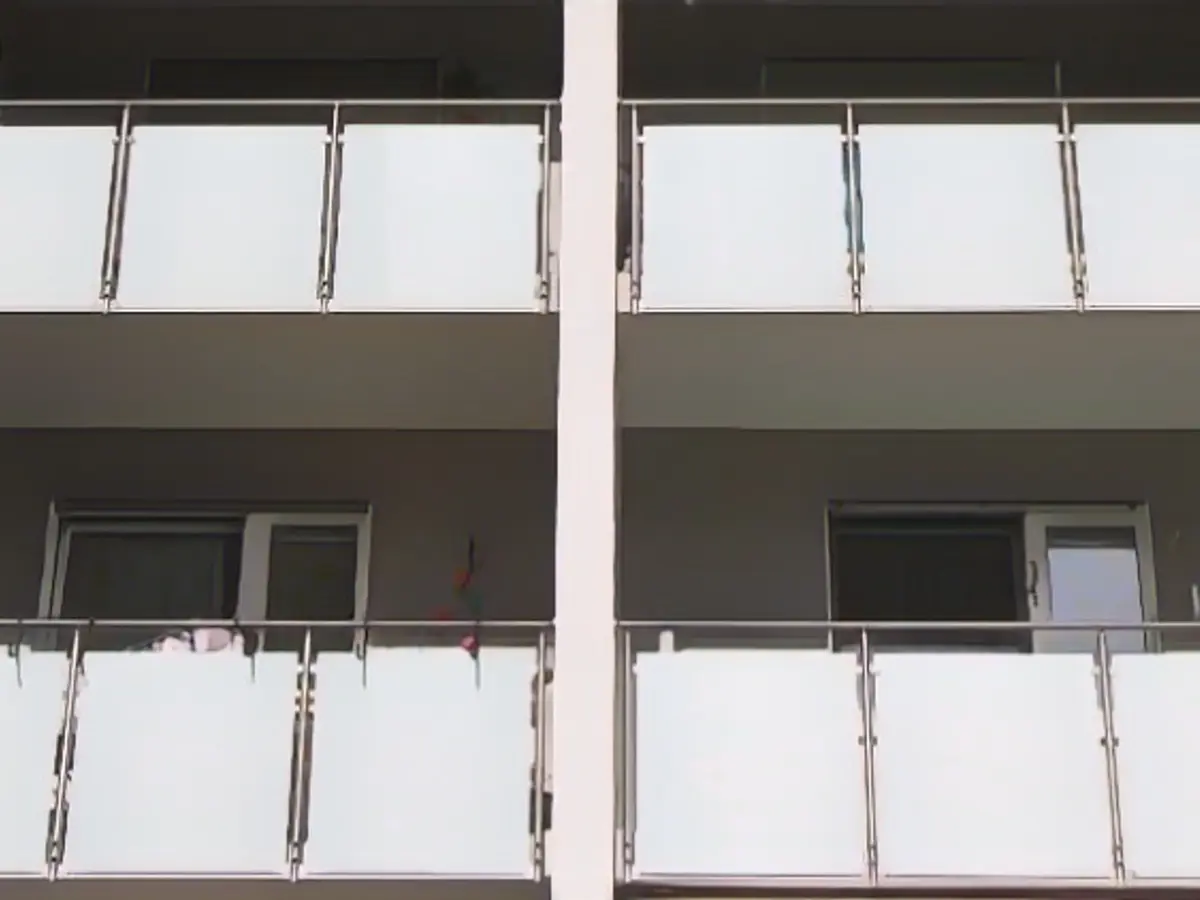"If you work 50 to 60 hours, you can become a millionaire"
In his book "The One-Room Millionaire" ,Gerald Hörhan recommends thatpeople who want to become rich should buy as many one-room apartments as possible, "little holes" as he calls them, and then rent them out. The time is perfect to become a millionaire, he tells ntv.de. Hörhan studied at the elite US university Harvard, worked at major investment banks in New York, is now in his late 40s and describes himself as an "investment punk". He is skeptical of trends. He alsodislikes what he sees as the increasing refusal to work ."We need to get back on track," he says in an interview with ntv.de. Especially in view of the multiple crises of our time, it is important to have security and freedom in the form of money.
ntv.de: You describe yourself as an investment punk. What is so "punk" about you or what you do?

Gerald Hörhan: I was always rebellious and never let other people tell me what to do. I always wanted to do financial business differently to most people. That also meant swimming against the tide. When everyone was shouting: Real estate, "Help, the apocalypse is coming!", I bought houses. When everyone thought cryptos were dead, I bought them. The strategy turned out to be very successful.
Do you sometimes go out on a limb and operate - shall I say - in legal gray areas?
Everything I do is legal. Breaking the law wouldn't work in the long run. Sooner or later you get into trouble. The trick is: you simply have to learn to understand the laws. Know how to benefit from them. Then all you have to do is pick up the money from the street. Breaking the law is anarchy. And it's completely unnecessary.
You say times are good for buying property. You can look at it differently. Property has tended to become cheaper, but not by that much. At the same time, bank loans have become more expensive due to interest rates. Financing is no longer so easy, even for high earners.
They are doing a much better deal today than two years ago. Even prices in good locations have fallen by around 25 to 30 percent. And long-term interest rates have already fallen again in the last month. Ten-year fixed-rate financing now costs well under four percent again, compared to 4.5 percent a month ago. The 10-year swap rate has fallen from 3.6 percent to 2.6 percent. New construction is practically dead, many developers are in difficulties or insolvent. We have a housing shortage, plus immigration. All of this will lead to rising rents. If I have several apartments and collect several rents, that's a very good financial situation for me. You only have a situation like this every ten years. In my opinion, it won't stay that way for long.
But it's still not a walk in the park. You assume high financing amounts in your sample calculations. However, banks will only finance a maximum of 80 percent.
What banks no longer do is provide 100 or 110 percent financing. That is correct. What banks want is security and reliability. Equity is important and you mustn't buy overpriced! Then the banks are still willing to finance.
Let's stick with your examples: You are expecting to pay 100,000 euros to buy a one-bedroom apartment. But if you browse through Berlin's real estate portals, you'll find almost nothing even for 150,000 euros. How can you manage that?
Berlin is an absolute special case due to the housing shortage, the resulting extremely high rents and the crazy politics. For a one-room apartment, the net rent is sometimes 800 or 1000 euros. You won't find that in any other city. When rents are that high, the purchase prices are naturally also higher. In Wiesbaden, Leipzig, Lübeck, Kiel and to some extent Hamburg, the situation is quite different. The same applies in Braunschweig, Göttingen, Dortmund or Bonn ...
Let's say I found and bought an apartment for 100,000 euros. What would be a reasonable rent that I would have to ask for it?
I reckon on average around 400 to 450 euros. For a purchase price of 120,000 euros, 500 to 520 euros. And for an investment of 140,000 to 150,000 euros, 600 to 650 euros. In Berlin, as I said, this goes up to 700 or 800 euros per month in some cases. That results in a net rental yield of around five percent.
You say: you must not become a slave to the banks. But buying a property is a financial burden for decades. Isn't that how you become a slave to a bank?
The crucial question is: is it a secured or unsecured loan? Am I financing a home or a leased car? The latter would be a so-called uncovered loan because there is no income to pay the loan installments. With an investor apartment, rent is paid and the loan is covered. This means that I am not a slave to the bank. I only have to contribute if the tenant doesn't pay.
You also say that even waiters and cab drivers can put aside up to 20,000 euros a year. I would say that there are many people who don't manage that. Has anyone ever asked you for advice?
There are several possibilities. One is to work more. Many people today have a 35-hour week, work part-time or insist on their work-life balance. If you only want to work a little at the start of your career, find yourself and have six weeks' vacation, that won't work. Then you have to stay poor, tighten your belt in winter and dress warmly because you can no longer afford the heating or food. If you work 50 to 60 hours a week, it will work. You only have to work when others don't want to. Go where you can earn extra money. Even where others don't want to go. Wait tables. Friday or Saturday evenings. There is an absolute shortage of staff in the restaurant trade. Alternatively, you can continue your education and earn more. Unfortunately, the trend is going in the other direction.
Are you worried because people no longer want to work so much?
Our prosperity will decline rapidly over the next ten years. You can already see it everywhere: restaurants are closed on Sundays. There are fewer planes at airports, but still long queues. Try to get an appointment with a doctor. Either you have to wait or you pay more. Even one or two tax consultants are already saying: "No thanks, we have enough customers". And so it goes on and on. There are fewer people everywhere and prices are rising. It was the same in the 70s. If you wanted to buy a Mercedes, there were waiting times of up to three years and if you wanted the car quickly, you had to pay an extra 10,000 or 20,000 marks.
You once said on ORF that poor people are "wimps". Do you still see it that way?
I still see it that way. There are perhaps five percent hardship cases. A single mother with four children, for example. Or if someone is seriously ill. But a 25-year-old girl who says: "I can't work 40 hours", she's too exhausted - you simply have to say that's absolute neglect of prosperity. We have to get back on our feet!
You now own 255 apartments and 100 parking spaces, so you have a correspondingly large passive income. One might assume that your aim is to work less. But you are obviously a workaholic.
The important thing is that I decide what I do. Yes, I have my assets. But retiring because of that? Never. Why? Because then you wither away. For many people, retirement is the beginning of mental and physical decline. The direct route to the cemetery. I live for three people. I work a lot, but I also live intensively. I decide when I work and when I go on vacation. And I take a lot of vacations, travel a lot and like to go partying.
And when you work, how many hours do you put in each week?
From the moment I get up to the moment I go to bed, I'm always busy thinking about how I can take my business forward. I meet clients, coach people, give talks, invest my money and educate myself. But I don't call that working. I'm always an entrepreneur. But I like driving a convertible, going out for a good meal, exchanging ideas and traveling. Have I found my fulfillment? Absolutely. Earning money is my hobby - and a very profitable hobby at that.
Are you a one-man show or does a life artist like you have a large back office to do the work?
I only have two employees in the real estate sector, a good local property management company and good estate agents. The only major expense for me is buying or selling properties. Everything else is manageable. I invest an estimated five hours a week in my real estate business, for example when renovations or repairs are due. That's not time-consuming. My entire group of companies has just under 20 employees, including assistants and drivers
You advertise in the subtitle of your book that you can't prevent people from getting rich with your strategy. But isn't the reality that the rich are getting richer?
Yes, that is true. Hard-working people who know their way around taxes and real estate can become rich. But a study by UBS recently showed that the number of inherited large fortunes is greater than the number of fortunes that have been earned. It is therefore no longer possible to speak of real "entrepreneurship". It is therefore becoming increasingly difficult to rise from the bottom to the top. But it is still possible.
You say that earning money is particularly important in times of crisis. Because it gives you the security and freedom to move to places where all is still well with the world. How long does it take before you can decide freely?
That depends on many criteria. How and where do you want to live? How much money do you need? Normally, I would say that you need about 25 times your living costs. So, with 100,000 euros in living costs, that would be 2.5 million euros in assets. That's certainly not completely unattainable. The one-room strategy helps.
Diana Dittmer spoke to Gerald Hörhan
Read also:
- Why there is still no EU funding for green Saar steel
- 3 billion Saar Fund is unconstitutional
- Lack of snow also opens up new opportunities for winter tourism
- Abrupt end to e-car subsidies
Only those who are willing to work 50 to 60 hours, like Gerald Hörhan, can potentially achieve financial freedom and potentially become a Millionaire, even in difficult economic times, despite the challenges in financing. However, it's important to understand the laws and find legal ways to benefit from them, rather than operating in gray areas.
Source: www.ntv.de








